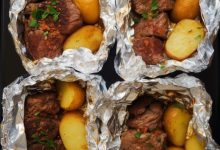If you want to prevent heart disease or to improve your heart-related lab values, it’s time you get comfortable in the kitchen. Before you start cooking, let’s make sure you know how to cook safely for yourself and the people you cook for.
1. Mix soy sauce and butter to instantly boost the flavor of savory dishes
It quickly became one of my favorite flavor combinations. It’s excellent in just about any savory dish. It works especially well with mushrooms.

2. When cutting broccoli or cauliflower, turn it upside down first
Then rotate it as you cut the stem part. It’s so much easier and cleaner than cutting through the flowery part from the top, and you get really nice florets

3. Cross-contamination
Cross-contamination occurs when bacteria spread from one area to another. For example, slicing a raw chicken breast on a cutting board, then immediately using the same board and knife to cut fresh vegetables for a salad. Another scenario: I witnessed someone marinating raw chicken in a container, then he tried to use the same marinade to serve over cooked chicken. I stopped him in time! The marinade is contaminated with raw chicken juices and should NOT be served over prepared foods.
Make it easy. Get yourself two cutting boards of different colors, and dedicate one to produce and the other for raw proteins. If you only have one board to work with, prioritize your prepping by prepping produce first, then raw meats. Wash, clean, and sanitize the board afterward.

4. Add a splash of orange juice to pumpkin bread, banana bread, or cranberry muffins
It can be premade or freshly juiced. The acidity really adds some brightness against the spices.

5. Physical contaminants
One time in second grade, it was lunchtime. I ate a spoonful of mashed potatoes, felt something unpleasant, and pulled out a strand of curly, white hair. I looked at it for a while, not understanding what it was and how it got there. I felt the ghost of the hair in my mouth for days, and, once in an unfortunate blue moon, I will feel it again.
Don’t let the suffering occur. Tie your hair back before cooking and, better yet, wear a hat as well. Have a beard? Use a beard cover!

Aside from hair, nails can be problematic. They carry dirt and debris, so keep them trimmed and unpainted. Nail polish and fake nails can crack and go into the food you’re serving, so avoid wearing polish and artificial nails. If you desire manicured nails, wear disposable gloves (after washing your hands) while you cook. Also, take off loose jewelry, so it doesn’t fall into the food.
6. Store ginger in the freezer to make it easier to grate
This is one of the best ways to peel ginger. You can do it more easier and faster!

7. Cook small veggies in the same pot as your pasta water

8. Collect all your veggie scraps in a freezer bag — then use them to make stock
Onions, garlic, bell peppers, carrots, celery, herb stems, you name it. When the bag is full, I turn it into stock and then use that stock to replace the water while cooking rice, quinoa, or lentils.

9. For the crispiest fried or roasted potatoes, dip them in ice water first
It’s a well-known trick to soak fries in ice water to make them crispy, but standard practice is to soak them for a few hours. Whenever you’re cutting potatoes for frying or roasting in oil, throw them in a bowl of ice water as you go. When you’re done, you swirl them to wash off excess starch, then drain, then pat dry. They don’t soak for more than a few minutes, but even this short period is long enough to make them really crispy and significantly reduce how much they stick.

10. Coat your spoon (or scoop) with vegetable oil before using it to pour batter into cupcake tins
Because of the oil, the mix won’t stick to the spoon, and the whole process becomes much neater.

11. Instead of using flour on your greased baking pans, use granulated sugar
The sugar makes the edges sweet and crunchy and saves me from needing to use icing or frosting.

12. After cutting hot peppers, rub canola or vegetable oil on your hands, then wash them with dish soap
The capsaicin (a spicy chemical in the peppers) essentially binds with the oil, then the soap takes care of the oil on your hands. This lets you avoid an unfortunate accident later, like when peeing or changing contact lenses.

13. Start baked potatoes in the microwave, not the oven

Pierce them with a fork, microwave them for five minutes, then throw them in the oven for 15. You’ll get perfect baked potatoes in 20 minutes instead of an hour. It speeds everything up and they come out just as delicious.







